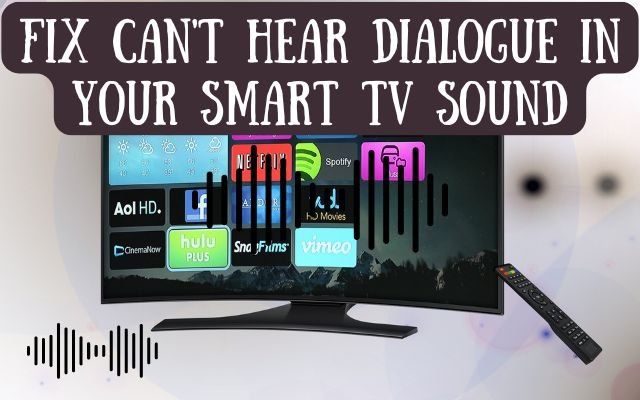Can’t Hear Dialogue? Here is How to Fix Your Smart TV Sound
Struggling to hear dialogue on your smart TV? Discover simple fixes to enhance sound clarity and enjoy your favorite shows!

If you can’t hear dialogue clearly on your smart TV, you’re not the only one. Many people find that voices in movies and TV shows are too quiet, especially compared to the loud background music and sound effects. This can make it hard to enjoy what you’re watching when the dialogue isn’t clear enough to understand.
The good news is you can fix this by adjusting your smart TV’s sound settings. A few simple changes can make the dialogue clearer without needing to turn the volume too high. Here’s how to Fix your TV sound to balance the audio so the dialogue is clear and easy to hear.
Check your TV’s audio settings for options like “Sound Mode” or “Dialogue Enhancement.” These settings make speech louder and background sounds quieter, so it’s easier to hear conversations. You can also adjust the “Equalizer” to improve sound balance, focusing more on the speech frequencies.
With a few simple tweaks, you’ll be able to hear dialogue clearly again and fully enjoy your TV shows and movies without missing a word.
Why Is TV Dialogue Hard to Hear?
There are many reasons why it can be hard to hear dialogue clearly on your smart TV. Let’s look at some of the main causes:
Smart TVs Are Thinner and Lighter
Modern smart TVs are lightweight and incredibly thin which helps you save room in your house. The sound quality of this design isn’t very good, though. Larger speakers may not fit as well, which could affect the sound quality. Many smart TVs have small speakers that produce a tinny, high-pitched sound. This kind of sound makes it difficult to hear the dialogue clearly, especially during quieter scenes. Therefore, even while these TVs fit well in your living room and have a nice appearance, the audio quality is frequently lacking.
Movie Audio Is Designed for Theaters
Many films are produced for theaters which have far superior sound systems than televisions at home. In theaters, sound can change a lot from quiet to loud, which makes it exciting. When you watch at home, you usually turn down the volume during loud parts so it’s not too noisy. But this can make the dialogue too soft, making it hard to hear what the characters are saying. Modern smart TVs are lightweight and incredibly thin, which helps you save room in your house. Sound quality of this design isn’t very good, though. Larger speakers may not fit as well, which could affect the sound quality.
Speech Patterns Have Changed in Media
In today’s fast-paced world, dialogue in movies and TV shows has also sped up. Actors usually speak more quickly in order to squeeze more into each scene because of the shorter form of content and lengthier commercial breaks. It can be challenging to understand all characters say when they speak quickly, particularly if their voice is unclear.
Background Music Competes with Dialogue
While characters are speaking, background music is frequently played in TV series and motion pictures. Because music overpowers the voices it may become even more difficult to hear conversation. It gets harder to grasp what is being said when music is louder.
Your TV’s Audio Settings Might Not Be Ideal
Sometimes, the audio settings on your smart TV are the only thing wrong. Dialogue can easily be lost in the mix if the sound isn’t optimized. To improve clarity, you can easily remedy this by changing the sound settings.
Other factors, like how your seating area is set up or the room’s acoustics, can also affect how well you hear dialogue. If the room’s layout or materials cause sound to echo or get muffled, it can make certain frequencies, like speech, harder to pick up clearly.
How to Improve Your TV Sound
Here are some simple fixes to help you hear dialogue better on your smart TV:
1. Try Different TV Modes
Your smart TV has different audio modes, and each one sounds different. These modes can change depending on the brand, so it’s good to explore them. For example, the standard mode balances treble and bass, while theater mode might make dialogue harder to hear. If your TV has a “news mode,” try that, as it usually makes voices clearer. You might also see a “Clear Voice” setting that boosts speech.
2. Reduce the Bass
Not all smart TVs have an equalizer, but if yours does, consider changing the default settings. If you can adjust the equalizer, try increasing the mid-high frequencies slightly. A boost of 3 to 5 dB between 2 kHz and 8 kHz is a good starting point. Experiment with different settings until you find one that makes the audio clearer.
3. Enable Dynamic Range
If other sounds are loud and the speech is quiet, consider activating the dynamic range option. Loud and gentle sounds are better balanced with this setting. Simply locate setting that regulates volume automatically in your audio settings.
4. Use External Audio Devices
If you still can’t hear dialogue after adjusting the settings, think about using an external audio device. Soundbars usually provide clearer sound than TV speakers. You can also use headphones to hear better, especially in noisy places. A soundbar can really improve your TV audio.
- How to Download a Complete Webpage for Offline Reading
- Tile Launches New Trackers to Keep Your Things Safe
- How to Detect Malware on Your Smartphone
FAQ: Fix Can’t Hear Dialogue in Your Smart TV Sound
Why is it hard to hear dialogue on my smart TV?
Many people struggle to hear dialogue clearly due to factors like small speakers, audio designed for theaters, fast-paced speech, competing background music and suboptimal audio settings. These issues can make it challenging to catch every word.
How can I improve dialogue clarity on my smart TV?
To improve dialogue clarity, experiment with different audio modes, turn down the bass, turn on dynamic range settings, or use external audio devices like soundbars or headphones.
What are best audio modes for clearer dialogue?
To improve speech and make talks simpler to understand: look for modes like “news” or “clear voice.”
How do I adjust the equalizer on my smart TV?
You can access the equalizer on your TV by going to the audio settings. To improve intelligibility of your speech, gently raise mid-high frequencies.
What should I do if background music is too loud?
One way to improve balance between loud and soft sounds is to change dynamic range option or turn off background music.



